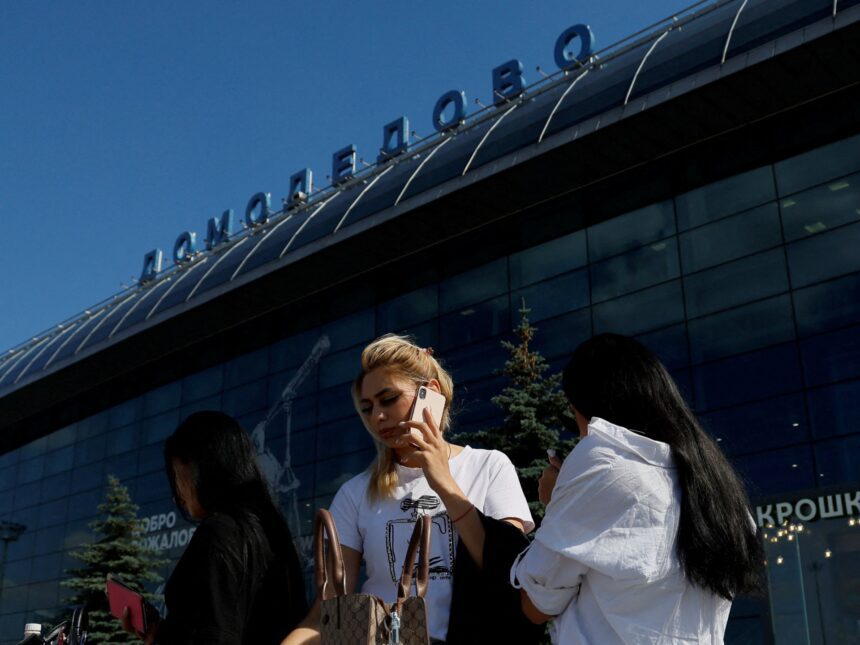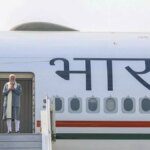Arseny, a young IT worker from Moscow, departed from Russia in September 2022 on the same day President Vladimir Putin declared a partial mobilisation of young men to serve on the front lines of Ukraine.
“On the day of the mobilisation, my mother called around noon,” he recalled.
“I woke up late and hadn’t gone to work yet. Everyone was reading the news: On the border with Georgia, for instance, there was a long queue and people were selling their cars. There was a general panic, and I flew to Yerevan.”
Estimates vary on how many Russians left their country after the full-scale invasion of Ukraine in 2022, but now, unable to establish a new life abroad or perhaps missing familiar comforts, it’s evident that many have returned home.
Arseny came back in December 2023 after spending over one year abroad.
Anastasia Burakova, a human rights lawyer and the founder of an antiwar initiative called “Kovcheg” (the Ark), told Al Jazeera that while the group does not have exact numbers, “perhaps about two million people departed the country.”
“However, many of them return because it is very challenging for individuals without experience in international collaboration or knowledge of foreign languages, among other things,” she noted.
Burakova’s group offers legal and psychological support, language courses, temporary housing for Russian emigrants, and also organises opposition activities from exile.
“For now, I can say that nearly one million people have remained abroad since the start of the war,” she stated.
“There were two significant waves of emigration. The first was right after the start of the war – primarily individuals who wish to speak out publicly and face political persecution were in this wave. The second wave happened after demobilisation was announced. The second wave was not pro-war but mostly apolitical, individuals staying out of politics and not keeping up with the news.”
Many of those who left are well-educated and relatively affluent, allowing them to continue working remotely. Their departure represented a drain of talent from their homeland.
Artur (not his real name), another IT worker from St Petersburg, left immediately after Putin’s announcement of what Russia terms its “special military operation” in Ukraine on February 24, 2022.
“The war started unexpectedly, and predicting the immediate consequences was very difficult,” he remarked.
“Since I had an open Schengen visa, and the border with Finland was still open, I thought it was a good strategy to leave for the EU and see what was happening from there. Luckily, I had a remote job and savings in cryptocurrency, which allowed me to leave in just one day.”
After a few months, Artur returned to St Petersburg to prepare his documents for a more permanent departure. However, when the mobilisation was declared, he quickly left again for Belgrade, the Serbian capital. Although he couldn’t open a bank account, he had enough funds to sustain himself.
But this new diaspora faced immediate challenges.
Many countries closed their borders to Russian citizens, with exceptions like humanitarian visas or asylum, which was a complex process.
“A lot of people with an antiwar stance stayed in non-visa countries in the South Caucasus, Black Sea region, and Balkans, and unfortunately, the situation there has deteriorated,” Burakova stated.
“The Kremlin is currently quite active in countries like Georgia and Serbia, and certainly in Central Asia. In these countries, I cannot say that it is 100 percent safe for Russian exiles.”
Burakova also mentioned that the majority of Russians do not possess both their internal and external passports, which are necessary for international travel.
The internal passport serves as a national ID card, and with it, travel is limited to only a few other former Soviet republics.
Travelling further presented additional challenges, such as language barriers, employment, and discrimination. Those who relocated to Armenia or Israel found themselves uncomfortably close to another conflict zone, as those nations are involved in conflicts with Azerbaijan and Gaza, respectively.
After moving to Yerevan, Arseny later went to Serbia, where the locals generally have positive views of Russians. However, he eventually lost his job.
“I was unemployed for six months, and I was running out of money,” he shared.
“When I started job hunting, there were some personal factors to consider. I could have found a job somewhere in Europe, but probably in a not-so-great company. In Russia, it was very easy for me to find employment.”
He returned in September 2023.
Meanwhile, in Belgrade, Artur missed his friends, family, and cat. He found the cost of living challenging, and when he noticed his other friends in Belgrade gradually returning to Russia one by one, he decided to join them.
“I doubted that Putin would end the conflict due to a brief wave of emigration, and was starting to realise that the Russian economy was much more resilient than expected, and that the war could drag on for years under the imposed sanctions, without posing a significant risk to the regime,” he reflected.
The initial fear of persecution back home faded.
“For a private person, there is not much risk of repression,” Artur argued.
“It exists, but there have not been many show trials that would make you seriously consider that it would affect you in any way. Of course, I wouldn’t broadcast my views everywhere, but I have never shied away from expressing my anti-war stance, and I can always argue that I have always been against war and see no reason to keep quiet about it.”
Artur admitted that conversations with friends who supported Russia’s invasion of Ukraine had become awkward, but he still tries to find common ground unless they openly endorse war crimes.
“Overall, I would say it is tolerable. Prices have soared in recent years, as they have everywhere, but life has become much more comfortable than it was in Serbia,” he observed.
“You have to give up openly expressing your viewpoint in exchange for this comfort. However, it seems like Russian society is very weary of the war; there are fewer posters with certain symbols on the streets. Among the majority of people around me, there is a consensus that the war must end; there is no sense of swimming against the current.”










